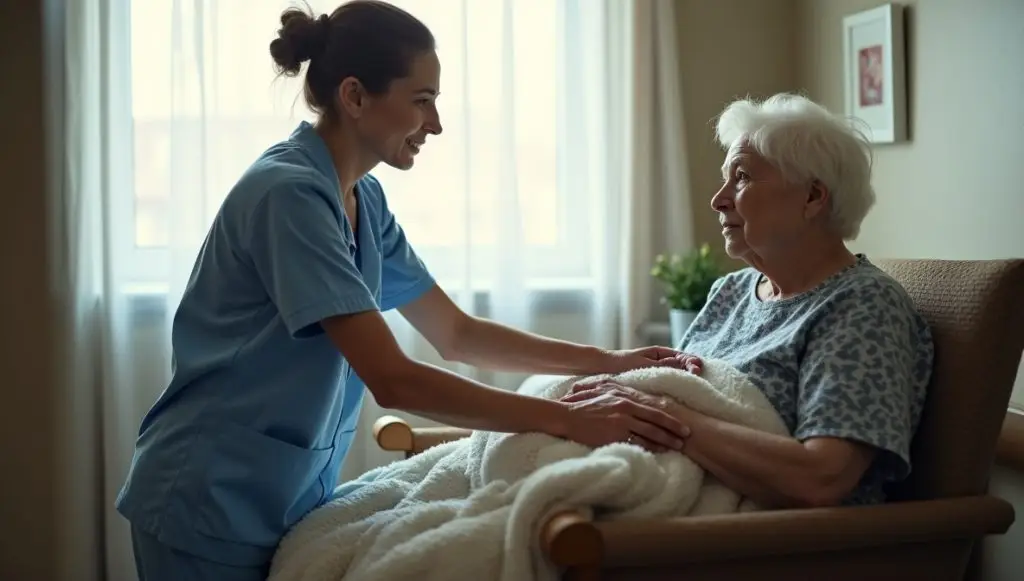Ohio healthcare background checks involve comprehensive screenings through the State Medical Board and Bureau of Criminal Investigation (BCI), requiring fingerprint-based criminal checks, license verifications, and professional history reviews. Understanding the specific requirements for your healthcare profession, maintaining accurate documentation, and allowing 6-10 weeks for processing are essential steps to secure your healthcare license in Ohio.
Key Takeaways
- Ohio healthcare professionals must complete both BCI and FBI fingerprint-based criminal background checks as part of the licensing process.
- The State Medical Board oversees physicians and physician assistants, while separate boards regulate nurses, pharmacists, and other healthcare professionals.
- Background check processing typically takes 6-10 weeks, though expedited options are available for additional fees.
- Full disclosure of criminal history, including dismissed charges, is required to maintain transparency and avoid application delays.
- License renewal occurs every two years and includes updated background checks and continuing education requirements.
- Employers may conduct additional background checks beyond state requirements, including drug screenings and employment verifications.
Introduction
Navigating Ohio's healthcare licensing system requires understanding the comprehensive background check process that protects patient safety while ensuring qualified professionals can practice. The state's multi-tiered approach involves coordination between regulatory boards, criminal investigation bureaus, and healthcare facilities to maintain the highest standards of care. Whether you're a recent graduate entering the healthcare field or an experienced professional relocating to Ohio, knowing what to expect from the background check process can mean the difference between a smooth licensing experience and frustrating delays.
The Ohio healthcare background check system encompasses far more than a simple criminal history review. It includes verification of educational credentials, professional licenses from other states, employment history, and ongoing monitoring requirements that continue throughout your career. This guide provides healthcare professionals with a comprehensive roadmap through Ohio's background check requirements, helping you prepare proper documentation, understand timelines, and avoid common pitfalls that can delay your ability to practice.
Understanding Ohio Healthcare Background Check Requirements
Background checks serve as the foundation of patient safety in Ohio's healthcare system. These comprehensive screenings verify criminal history, professional credentials, and educational qualifications to ensure only qualified individuals provide patient care. The process might seem overwhelming at first, but breaking it down into manageable components makes it much easier to navigate.
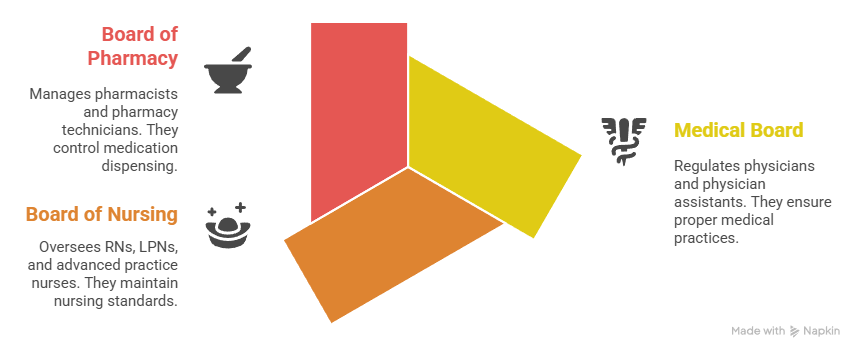
Ohio's regulatory framework involves multiple oversight bodies working in coordination. The State Medical Board regulates physicians and physician assistants, while the Board of Nursing oversees RNs, LPNs, and advanced practice nurses. The Board of Pharmacy manages pharmacists and pharmacy technicians. Each board has specific requirements, but all utilize the Bureau of Criminal Investigation for criminal background screenings. This collaborative approach ensures consistent standards across all healthcare professions while addressing the unique needs of each field.
| Regulatory Body | Healthcare Professionals Covered |
| State Medical Board | Physicians, Physician Assistants |
| Board of Nursing | RNs, LPNs, APNs |
| Board of Pharmacy | Pharmacists, Pharmacy Technicians |
The screening process examines more than criminal records—it includes verification of all professional licenses, educational credentials, and any disciplinary actions across state lines.
Types of Background Checks Required
Healthcare professionals in Ohio must complete several distinct background checks to obtain licensure. Each type serves a specific purpose in maintaining healthcare standards and patient safety. Understanding what each check involves helps you prepare the necessary documentation and avoid surprises during the application process.
Criminal Background Checks
Both state and federal criminal checks are mandatory for all healthcare positions. The process requires submitting fingerprints to the BCI for state-level screening and the FBI for federal database searches. These fingerprints serve as your unique identifier, ensuring accurate matching of any criminal records that may exist in state or federal databases.
The criminal background check process has become more streamlined in recent years thanks to electronic fingerprinting technology. Most applicants can complete their fingerprinting appointment in less than 30 minutes, and electronic submission means faster processing times compared to traditional ink-and-paper methods. However, it's important to choose an authorized location to ensure your prints are accepted by the licensing boards.
- BCI Check: Reviews Ohio criminal records including arrests, convictions, and pending charges
- FBI Check: Searches federal databases for interstate criminal activity
- Processing Time: Results typically available within 5-30 business days
- Cost: Fees vary by profession but generally range from $50-100 combined
These checks reveal comprehensive criminal history that boards use to assess candidate suitability for patient care roles.
Professional Verification Requirements
Beyond criminal screening, Ohio requires thorough verification of your professional background. This multi-faceted review ensures all credentials are legitimate and current. The verification process protects patients by confirming that healthcare providers have the education and training they claim to possess. It also helps maintain the integrity of Ohio's healthcare system by preventing fraud and misrepresentation.
Professional verifications can take longer than criminal checks because they often require contacting multiple institutions and waiting for responses. Schools may need time to locate transcripts, especially for older graduates, and previous employers might have specific procedures for releasing employment information. Starting this process early and following up regularly can help prevent delays in your overall application timeline.
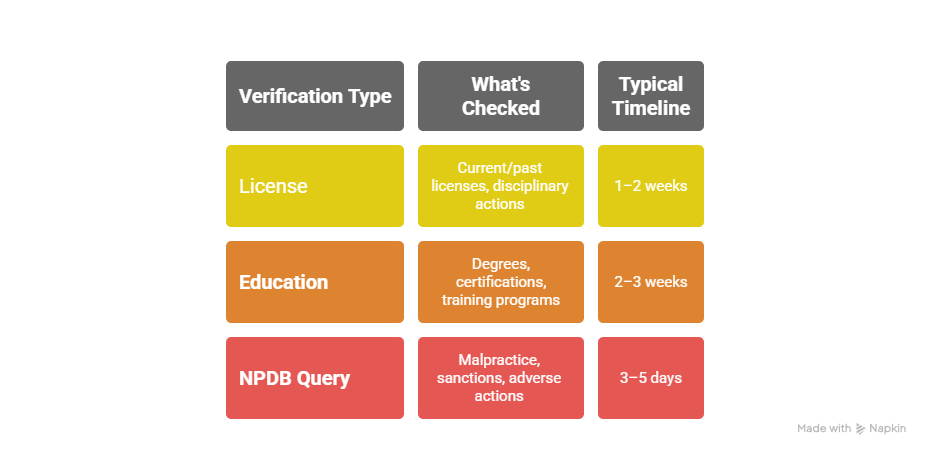
Maintaining accurate records and providing complete information expedites these verifications significantly.
Ohio State Medical Board Application Process
The State Medical Board maintains strict application requirements to ensure physician and physician assistant qualifications meet Ohio's healthcare standards. The application process reflects the high level of responsibility these professionals carry in patient care settings. Every document submitted undergoes careful review to verify authenticity and completeness.
Start your application by gathering all required documents before submission. This includes official medical school transcripts, training verification letters, proof of completed residencies, and a recent passport-style photograph. Missing documents are the primary cause of application delays. Many applicants underestimate the time needed to collect these materials, especially if they attended school or trained in multiple states. Creating a checklist and starting document collection several weeks before you plan to apply can save considerable time and stress.
- Application Fee: $305 for physicians, $250 for physician assistants
- Document Requirements: Official transcripts, training certificates, photo ID
- Criminal Disclosure: All convictions, pending charges, and dismissed cases
- Professional References: Three references from medical professionals
- Processing Timeline: 6-10 weeks for complete applications
Criminal history disclosure requires complete transparency—include all arrests, convictions, and pending charges regardless of outcome or time elapsed.
BCI Background Check Services
Ohio's Bureau of Criminal Investigation provides the primary criminal screening service for healthcare professionals. Understanding the BCI process helps ensure smooth application processing. The BCI has modernized its services significantly over the past decade, making it easier for applicants to complete required screenings efficiently. Their WebCheck system represents a major advancement in fingerprinting technology and data processing.
Fingerprinting Locations and Process
BCI-authorized fingerprinting locations operate throughout Ohio, including law enforcement agencies, private fingerprinting services, and select healthcare facilities. The variety of locations means most applicants can find a convenient option near their home or workplace. Some locations offer walk-in services while others require appointments, so it's worth calling ahead to confirm their procedures and current wait times.
When preparing for your fingerprinting appointment, make sure your hands are clean and dry for the best results. Avoid using hand lotion immediately before your appointment, as this can interfere with electronic scanners. If you have worn fingerprints due to your occupation or medical conditions, inform the technician so they can use alternative techniques to capture the clearest prints possible.
- Local sheriff's offices and police departments
- WebCheck locations (electronic fingerprinting)
- Private fingerprinting services
- Mobile fingerprinting units for group processing
- Healthcare facility HR departments (select locations)
Bring valid photo identification and any required authorization forms to your appointment. Electronic fingerprinting typically provides faster results than traditional ink methods.
Processing Standards and Timelines
BCI processes thousands of healthcare background checks monthly, with varying turnaround times based on several factors. Standard processing takes 5-10 business days for clean records, while complex histories may require 20-30 days. The complexity of your background directly impacts processing time—common names may require additional verification, and any criminal history needs thorough review by qualified staff members.
During peak hiring seasons, typically spring and early summer, processing times may extend slightly due to increased volume. Planning ahead and submitting your application during slower periods can help avoid these delays. The BCI provides status updates through their online portal, allowing you to track your background check progress without making phone calls or sending emails.
| Check Type | Standard Timeline | Expedited Timeline |
| BCI Only | 5-10 days | 2-3 days |
| BCI + FBI | 10-20 days | 5-7 days |
| Complex History | 20-30 days | 10-15 days |
Reports include all arrest records, convictions, and pending charges within Ohio's criminal justice system.
Specific Requirements by Healthcare Profession
Each healthcare profession in Ohio maintains unique background check requirements tailored to their specific patient care responsibilities. Understanding your profession's requirements prevents application delays and ensures compliance. These variations reflect the different levels of patient interaction, medication access, and clinical responsibilities associated with each role. The boards work together to maintain consistency while addressing profession-specific concerns.
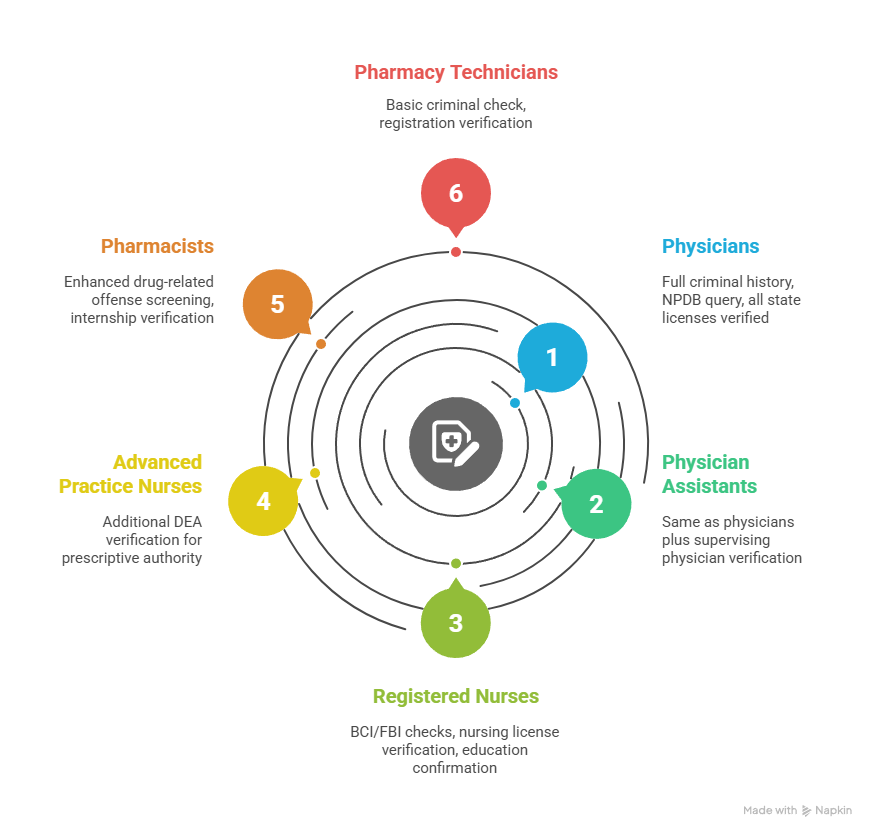
Physicians and physician assistants face the most comprehensive screening requirements. Beyond standard BCI and FBI checks, they must complete NPDB queries, provide detailed employment history for the past 10 years, and submit to ongoing monitoring through the State Medical Board's reporting system. This extensive screening reflects their broad scope of practice and the critical decisions they make in patient care. The medical board also considers international medical graduates' backgrounds, requiring additional documentation from foreign institutions.
- Physicians: Full criminal history, NPDB query, all state licenses verified
- Physician Assistants: Same as physicians plus supervising physician verification
- Registered Nurses: BCI/FBI checks, nursing license verification, education confirmation
- Advanced Practice Nurses: Additional DEA verification for prescriptive authority
- Pharmacists: Enhanced drug-related offense screening, internship verification
- Pharmacy Technicians: Basic criminal check, registration verification
Nursing professionals must disclose any criminal history that could impact patient safety, with particular scrutiny on drug-related offenses, theft, or patient abuse charges.
Timeline and Processing Expectations
Realistic timeline expectations help healthcare professionals plan their career transitions effectively. Ohio's multi-step verification process requires patience and proper planning. Many applicants make the mistake of assuming they can start work immediately after submitting their application, leading to financial stress and scheduling conflicts. Understanding the actual timeline helps you make informed decisions about when to leave current positions and schedule start dates with new employers.
Standard processing encompasses several sequential steps that cannot be rushed. Initial application review takes 1-2 weeks, followed by background check processing (2-4 weeks), and final board review (2-4 weeks). The total timeline typically spans 6-10 weeks for complete applications. Each step must be completed before the next can begin, and any issues discovered during review can add additional time. Boards prioritize complete applications, so missing even one document can push your file to the back of the queue.
- Initial application review and fee processing: 5-7 business days
- Background check completion: 10-20 business days
- Professional verification contacts: 10-15 business days
- Board review and decision: 10-14 business days
- License issuance: 3-5 business days after approval
Expedited processing options can reduce total time by 30-50%, though not all application components can be accelerated.
Compliance and Ongoing Requirements
Maintaining your Ohio healthcare license requires ongoing compliance with background check and reporting requirements. These obligations continue throughout your career, not just during initial licensing. Many healthcare professionals mistakenly believe that once they receive their license, the background check process is complete. In reality, Ohio's healthcare boards maintain active monitoring systems to ensure continued compliance with professional standards.
License renewal occurs biennially and includes updated background checks, continuing education verification, and fee payment. The renewal process typically requires less time than initial licensing but still demands attention to detail and timely submission. Missing renewal deadlines can result in license expiration, requiring reinstatement procedures that are more complex and time-consuming than standard renewal. Setting calendar reminders well in advance of renewal dates helps avoid these complications.
| Requirement | Frequency | Details |
| License Renewal | Every 2 years | Background check update, CEUs, fees |
| Criminal Disclosure | Within 30 days | Report new charges or convictions |
| Employer Checks | Varies | Annual or as required by facility |
Failure to maintain compliance can result in license suspension or revocation, making ongoing attention to these requirements essential.
Common Challenges and Solutions
Healthcare professionals frequently encounter similar obstacles during the background check process. Understanding these challenges and their solutions streamlines your application experience. The most successful applicants are those who anticipate potential problems and prepare solutions in advance. Learning from others' experiences can help you avoid common pitfalls and move through the process more smoothly.
Documentation issues remain the most common problem, particularly with fingerprint quality and verification delays. Poor fingerprint quality can result from dry skin, worn fingerprints from manual labor, or improper technique during capture. Schedule appointments during optimal conditions and consider moisturizing hands beforehand for clearer prints. Some applicants may need multiple attempts to capture acceptable prints, especially those who work with their hands or have certain skin conditions. Planning for potential re-fingerprinting saves time and reduces frustration.
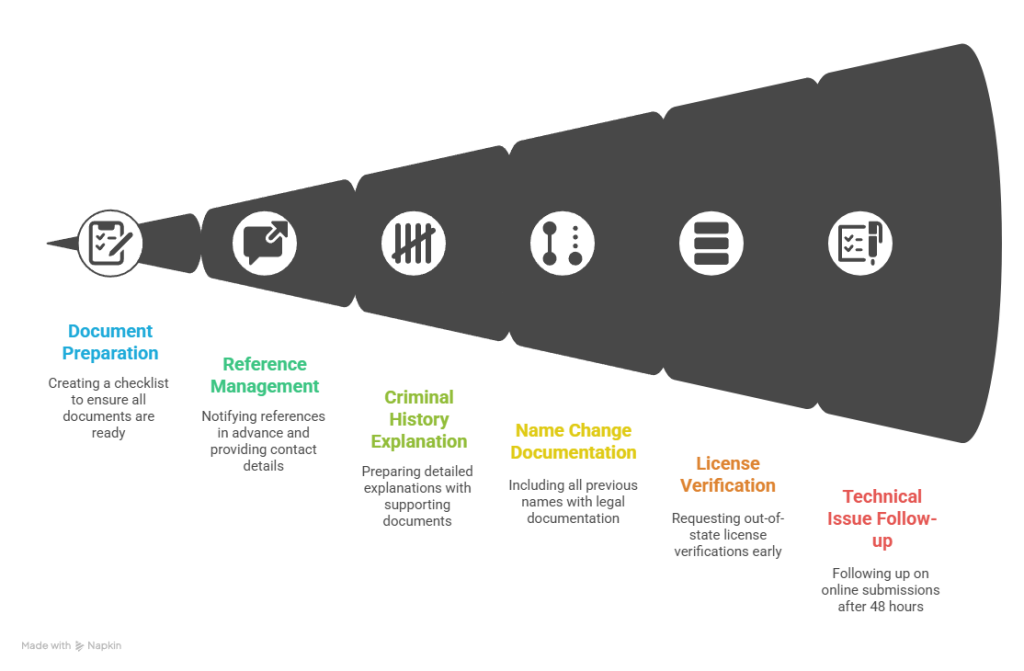
- Missing Documents: Create a checklist and gather everything before starting
- Reference Delays: Notify references in advance and provide their direct contact information
- Criminal History: Prepare detailed explanations with supporting documentation
- Name Changes: Include all previous names with proper legal documentation
- Out-of-State licenses: Request verifications early as interstate processing takes longer
- Technical Issues: Follow up if online submissions show no progress after 48 hours
Proactive communication with licensing boards and quick response to any requests for additional information prevents minor issues from becoming major delays.
Conclusion
Ohio healthcare background checks represent a critical step in protecting patient safety while ensuring qualified professionals can practice. Success requires understanding your specific profession's requirements, maintaining complete and accurate documentation, and allowing adequate time for the multi-step process. By following the guidelines outlined in this guide and maintaining ongoing compliance with renewal requirements, healthcare professionals can navigate Ohio's licensing system efficiently and focus on their primary goal—providing excellent patient care.
Frequently Asked Questions
How long does an Ohio healthcare background check take?
Standard processing takes 6-10 weeks from application submission to license issuance. This includes 10-20 days for criminal background checks, plus additional time for application review and professional verifications.
What disqualifies someone from Ohio healthcare licensure?
Disqualifying factors include felony convictions related to patient care, drug trafficking offenses, healthcare fraud, and falsification of application materials. Each case is reviewed individually by the relevant licensing board.
Can I work while my background check is processing?
Some employers offer provisional employment pending background check completion, but this varies by facility policy. Confirm with your potential employer before making assumptions about start dates.
Do I need to report dismissed criminal charges?
Yes, Ohio requires disclosure of all criminal history including dismissed charges, expungements, and sealed records. Full transparency prevents complications during the review process.
How often must I renew my background check?
Background checks are updated with each license renewal cycle, typically every two years. Employers may require additional checks based on their policies.
What's included in an Ohio BCI background check?
BCI checks include all Ohio arrest records, convictions, pending charges, and warrant information. Federal checks through the FBI add interstate criminal history.
Additional Resources
- Ohio State Medical Board Official Website
https://med.ohio.gov - Ohio Bureau of Criminal Investigation WebCheck Locations
https://www.ohioattorneygeneral.gov/Business/Services-for-Business/WebCheck - Ohio Board of Nursing Licensing Information
https://nursing.ohio.gov - Ohio Board of Pharmacy Background Check Requirements
https://pharmacy.ohio.gov - National Practitioner Data Bank (NPDB) Self-Query
https://www.npdb.hrsa.gov

GCheck Editorial Team
Meet the GCheck Editorial Team, your trusted source for insightful and up-to-date information in the world of employment background checks. Committed to delivering the latest trends, best practices, and industry insights, our team is dedicated to keeping you informed.
With a passion for ensuring accuracy, compliance, and efficiency in background screening, we are your go-to experts in the field. Stay tuned for our comprehensive articles, guides, and analysis, designed to empower businesses and individuals with the knowledge they need to make informed decisions.
At GCheck, we're here to guide you through the complexities of background checks, every step of the way.





